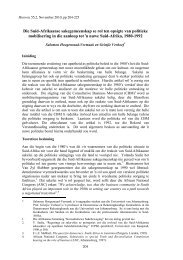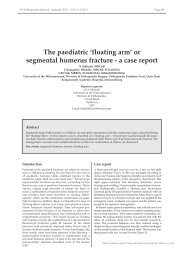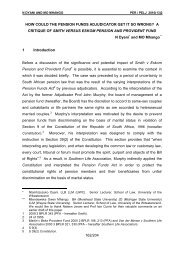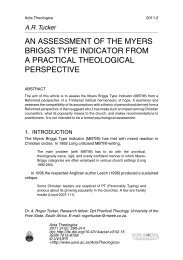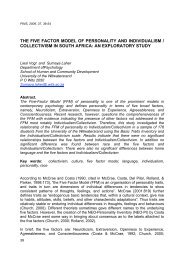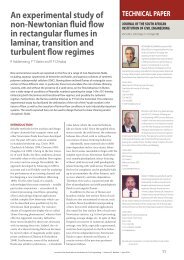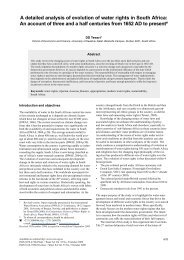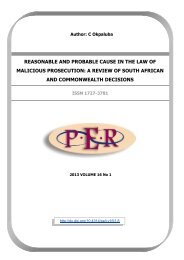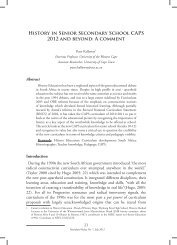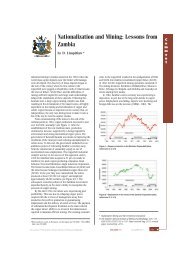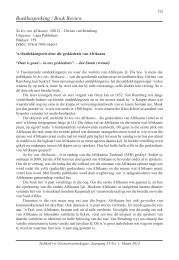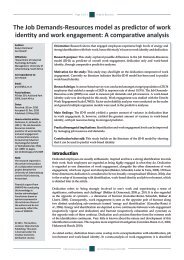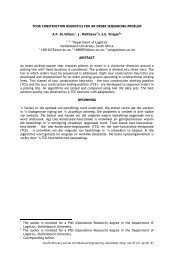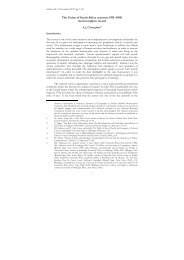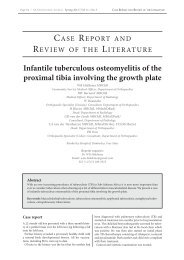91 Hendrik Verwoerd and the Leipzig School of Psychology in 1926 ...
91 Hendrik Verwoerd and the Leipzig School of Psychology in 1926 ...
91 Hendrik Verwoerd and the Leipzig School of Psychology in 1926 ...
Create successful ePaper yourself
Turn your PDF publications into a flip-book with our unique Google optimized e-Paper software.
<strong>Hendrik</strong> <strong>Verwoerd</strong> <strong>and</strong> <strong>the</strong> <strong>Leipzig</strong> <strong>School</strong> <strong>of</strong> Pscyhology<br />
psychology <strong>and</strong> ethnopsychology (Völkerpsychologie). The focus will fall<br />
exclusively on <strong>the</strong> last two. 12<br />
The <strong>Leipzig</strong> Institute <strong>and</strong> holistic psychology<br />
The <strong>Leipzig</strong> Institute for Experimental <strong>Psychology</strong> was founded <strong>in</strong> 1879 by<br />
Wilhelm Wundt (1832–1920). The first psychological research <strong>in</strong>stitute <strong>in</strong> <strong>the</strong><br />
world, it was funded by Wundt himself dur<strong>in</strong>g <strong>the</strong> early years. Wundt was a<br />
protagonist <strong>of</strong> positivist methodology <strong>in</strong> psychological research, a field that<br />
was closely connected to associationist psychology. 13 He believed that<br />
sensations were <strong>the</strong> basic units <strong>of</strong> psychological measurement <strong>and</strong> thus not<br />
fur<strong>the</strong>r divisible. The associations were comb<strong>in</strong>ations <strong>of</strong> sensations <strong>in</strong> an<br />
approach that was rooted <strong>in</strong> <strong>the</strong> tradition <strong>of</strong> David Hume’s epistemology. 14<br />
Wundt’s sensations were structurally similar, ra<strong>the</strong>r like “psychic atoms”.<br />
From <strong>the</strong>m perception, experience <strong>and</strong> reactions were constituted as<br />
“psychic formations” (psychische Gebilde), to use Wundt’s term<strong>in</strong>ology.<br />
These psychic formations were made up <strong>of</strong> <strong>the</strong> same basic units, differ<strong>in</strong>g<br />
from each o<strong>the</strong>r only <strong>in</strong> <strong>the</strong> complexity <strong>of</strong> <strong>the</strong>ir structure <strong>and</strong> <strong>the</strong> number <strong>and</strong><br />
comb<strong>in</strong>ation <strong>of</strong> <strong>the</strong> sensations <strong>and</strong> associations. It was <strong>the</strong>refore<br />
<strong>the</strong>oretically possible to identify <strong>the</strong> “psychic formations” <strong>of</strong> a higher order by<br />
<strong>the</strong> <strong>in</strong>ductive measurement <strong>of</strong> psychic elements. Like his 19th century<br />
predecessors, Wundt saw perception <strong>and</strong> reaction as two different<br />
processes. The reaction time, that is, <strong>the</strong> time between perception <strong>and</strong><br />
reaction, was <strong>the</strong> focus <strong>of</strong> much research <strong>in</strong> early experimental psychology.<br />
<strong>Psychology</strong> was considered to be a science, but <strong>the</strong> closeness to<br />
philosophy <strong>in</strong> Wundt’s work, especially his ethnopsychology, is typical <strong>of</strong> <strong>the</strong><br />
early days <strong>of</strong> German psychology.<br />
Wundt’s ideas had a considerable impact on <strong>the</strong> beg<strong>in</strong>n<strong>in</strong>gs <strong>of</strong> <strong>the</strong><br />
new science not only <strong>in</strong> Germany but also <strong>in</strong> <strong>the</strong> United States, for many <strong>of</strong><br />
his students <strong>and</strong> assistants came from North America <strong>and</strong> later became<br />
<strong>in</strong>fluential <strong>in</strong> <strong>the</strong>ir own right. They left <strong>the</strong>ir mark both on <strong>the</strong> development <strong>of</strong><br />
behaviourism as well as on various areas <strong>of</strong> applied psychology, even<br />
12. The topic <strong>of</strong> characterology can only be treated adequately by deal<strong>in</strong>g with<br />
<strong>Verwoerd</strong>’s stay <strong>in</strong> Germany as a whole as well as with his read<strong>in</strong>gs dur<strong>in</strong>g <strong>the</strong><br />
years afterwards; this must be reserved for ano<strong>the</strong>r article. I have translated<br />
Völkerpsychologie as ethnopsychology s<strong>in</strong>ce I regard <strong>the</strong> term “folk psychology”<br />
(which is more usually used) as mislead<strong>in</strong>g.<br />
13. On Wundt’s psychology see M. Galliker, M. Kle<strong>in</strong> <strong>and</strong> S. Rykart, Meilenste<strong>in</strong>e der<br />
Psychologie. Die Geschichte der Psychologie nach Personen, Werk und Wirkung<br />
(Kröner, Stuttgart, 2007), pp 196ff. Wundt’s negative attitude towards applied<br />
psychology is discussed <strong>in</strong> W. Meischner, “Wilhelm Wundt”, <strong>in</strong> H.E. Lück <strong>and</strong> R.<br />
Miller (eds), Illustrierte Geschichte der Psychologie (Beltz, We<strong>in</strong>heim <strong>and</strong> Basel,<br />
2005), pp 35–40.<br />
14. D. Hume, A Treatise <strong>of</strong> Human Nature, vol. 1 (J.M. Dent <strong>and</strong> E.P. Dutton, London<br />
<strong>and</strong> New York, 1939), pp 19ff. On associationist psychology generally, see H.<br />
Rohracher, E<strong>in</strong>führung <strong>in</strong> die Psychologie, 13th edition, (Psychologie Verlags<br />
Union, München <strong>and</strong> We<strong>in</strong>heim, 1988), pp 282ff.<br />
94



